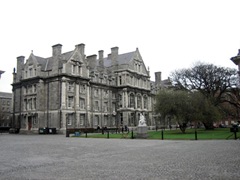Quinn reviews Hunt report
 Higher education needs more critical mass to reach its potential, according to the Hunt report. Decisions must now be taken by a sceptical Education Minister.
Higher education needs more critical mass to reach its potential, according to the Hunt report. Decisions must now be taken by a sceptical Education Minister.
One of Fianna Fáil’s last policies, the ‘National Strategy for Higher Education’, was launched on 11 January and runs to 2030. The strategy was the end result of a long review of the sector by economist and banker Colin Hunt, which started on 6 February 2009, and the final decisions now rest with new Education Minister Ruairí Quinn.
Demand for higher education, it predicted, would grow by over 70 per cent and it was therefore “essential” to expand participation.
Expansion, it warned, was not possible without putting an extra €500 million into the system. Demand for investment was increasing but “severe constraints” would limit public finances in the initial years.
As a result, the package would partly be covered by upfront tuition fees. Students would be means-tested according to their family assets as well as income, which could disadvantage farming families. All students would be supported by the same funding model, a move partly designed to encourage lifelong learning as an alternative to expensive full-time study.
The then Education Minister Mary Coughlan made clear that she did not want students to be “left with an unmanageable debt burden upon graduation” but they should make an “equitable contribution to the overall cost of the significant economic advantage they gain from higher education.”
Separately, a new academic appraisal system would aim for “parity of esteem” between teaching and research. Academics appeared to spend more time on research than teaching, and needed training in teaching as well as their chosen discipline.
Research priorities must reflect whether Ireland will make a return on that investment, either economic or social, and would need to be continually reviewed in the light of global trends. A goal of 3 per cent GDP invested in R&D is set out, compared to an estimated 1.43 per cent in 2008.
A smaller number of higher education institutions is foreseen i.e. “consolidation to support quality” in Coughlan’s words. At present, the state has seven universities and 14 institutes of technology.
No university applications using existing legislation (Section 9 of the Universities Act 1997) would be approved. Institutes of technology would be encouraged to merge and seek re-designation as ‘technological universities’ provided that robust criteria are met; new legislation is needed to provide for this.
A majority of governing body members must also be drawn from outside the institution. The whole process would be overseen by a stronger Higher Education Authority; a review of its remit started in January.
The Department of Education and Skills has no timescale on the report’s implementation, as Ruairí Quinn has just taken office as Education Minister.
While in opposition, Quinn criticised the department’s “lack of urgency” by delaying the report, and said the end result was “particularly vague” on undergraduate fees.
“It fails to recognise that students already make a direct financial contribution for part-time and postgraduate courses and that all undergraduates currently pay a €1,500 student charge, which will rise to €2,000 next September,” he stated.
Hunt’s conclusions in that area “would receive a D mark if submitted as an answer to a commerce degree exam.” However, he welcomed the consolidation of institutes of technology and was pleased that the report discussed the high drop-out rate among first year college students.
Fine Gael backed a graduate tax while Labour opposed the re-introduction to fees; the party’s manifesto expected “radical reform in third level institutions to maximise their existing funding”.
In Quinn’s view, the Department of Justice’s attitude to foreign student visas was the “biggest single obstacle” to realising their potential. To that end, the Programme for Government aims to overhaul the visa system and double the number of international students, particularly those from India, China and the Middle East. Postgraduates will also be allowed to stay and work for up to a year after completing their studies.





